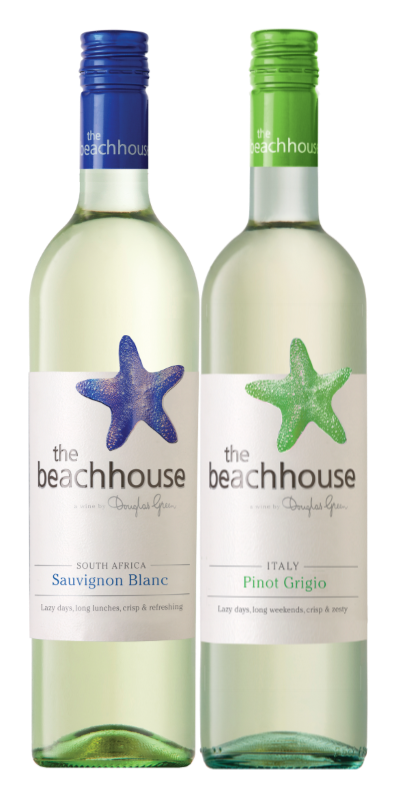 A recent application before the United States Patent and Trademark Office sought to register the mark The Beachhouse, A Wine by Douglas Green (in standard characters) for wines in International Class 33 on the Principal Register. See In re LDGB (PTY) LTD, Serial No. 85944842 (April 29, 2016) [not precedential]. The application for registration was originally refused by the Examining Attorney under Section 2(d) of the Trademark Act, 15 U.S.C. § 1052(d), on the ground that Applicant’s mark resembled the mark BEACH HOUSE WINERY in standard characters (“winery” disclaimed), previously registered for wine in International Class 33, and was likely to cause confusion. Applicant appealed to the Trademark Trial and Appeal Board and requested reconsideration.
A recent application before the United States Patent and Trademark Office sought to register the mark The Beachhouse, A Wine by Douglas Green (in standard characters) for wines in International Class 33 on the Principal Register. See In re LDGB (PTY) LTD, Serial No. 85944842 (April 29, 2016) [not precedential]. The application for registration was originally refused by the Examining Attorney under Section 2(d) of the Trademark Act, 15 U.S.C. § 1052(d), on the ground that Applicant’s mark resembled the mark BEACH HOUSE WINERY in standard characters (“winery” disclaimed), previously registered for wine in International Class 33, and was likely to cause confusion. Applicant appealed to the Trademark Trial and Appeal Board and requested reconsideration.
The Board noted that Applicant’s and Registrant’s goods are identical (i.e., both wine) and thus the Board presumed that the channels of trade and classes of purchasers are the same. Id. at 3. This thus strongly supports a finding of likelihood of confusion with respect to the likelihood of confusion analysis.
The Board then looked to the similarity or dissimilarity of the marks in their entireties with respect to appearance, sound, connotation, and commercial impression. When goods are identical, the degree of likelihood of similarity required to find a likelihood of confusion declines. Id. at 3–4. The Board noted that both Applicant’s mark and Registrant’s mark contained the term BEACHHOUSE (or similar) as shared terms, which were also the first words and thus enhanced the similarity between the marks. Id. at 5. The Board thus found the marks to be visibly and aurally similar because BEACH HOUSE (whether one or two words) is the first and dominant portion of each mark. Additionally, the marks incorporated “wine” or “winery” as descriptive terms which the Board found contributed to a similar connotation and overall commercial impression. Id.
The Board did not agree with Applicant’s argument that “A Wine By Douglas Green” significantly distinguished Applicant’s mark from Registrant’s mark in the minds of consumers. Instead, the Board thought consumers were likely to believe Applicant’s mark was a variation of Registrant’s mark “pointing to a common source.” Id.
Applicant further argued that the “DOUGLAS GREEN” mark is well-known and that consumers who spot a wine with the mark “The Beach House, A Wine By Douglas Green” will recognize Douglas Green as the brand and will associate the Beachhouse mark solely with Douglas Green. The Board noted that “as a general rule, the addition of a house mark to one or two otherwise confusingly similar marks will not serve to avoid a likelihood of confusion.” Id. at 6. The Board further reasoned that, to the extent Applicant was trying to “assert rights in a family of Douglas Green-formative marks, the family of marks doctrine is not available to an applicant seeking to overcome a likelihood of confusion refusal in an ex parte proceeding.” Id. at 7. Instead, the focus must be on the mark which the Applicant is seeking to register, not other marks that the Applicant may be used or may have registered. Id.
For those reasons, the Board foudn that Applicant’s mark was similar to Registrant’s mark and that the first du Pont factor also supported a finding of likelihood of confusion.
The Board then examined Applicant’s final argument. Applicant maintained that it would be inconsistent to refuser registration of its mark while allowing the Registrant’s mark to coexist with a third-party registration for BEACH HAUS for beer in International Class 32. Board notes that the registration for BEACH HAUS was cancelled per 15 U. S. C. § 1058 during the pendency of this actual appeal. The Board noted, however, even if that registration were subsisting, it would not change the outcome here as each case must be decided on its own merits.
For the above reasons, the Board thus found that Applicant’s mark was likely to cause confusion with Registrant’s mark when used in association with wines and refused to register Applicant’s mark for The Beachhouse, A Wine by Douglas Green.
For more information on wine or alcohol law, or trademarks, please contact Lindsey Zahn.
DISCLAIMER: This blog post is for general information purposes only, is not intended to constitute legal advice, and no attorney-client relationship results. Please consult your own attorney for legal advice.